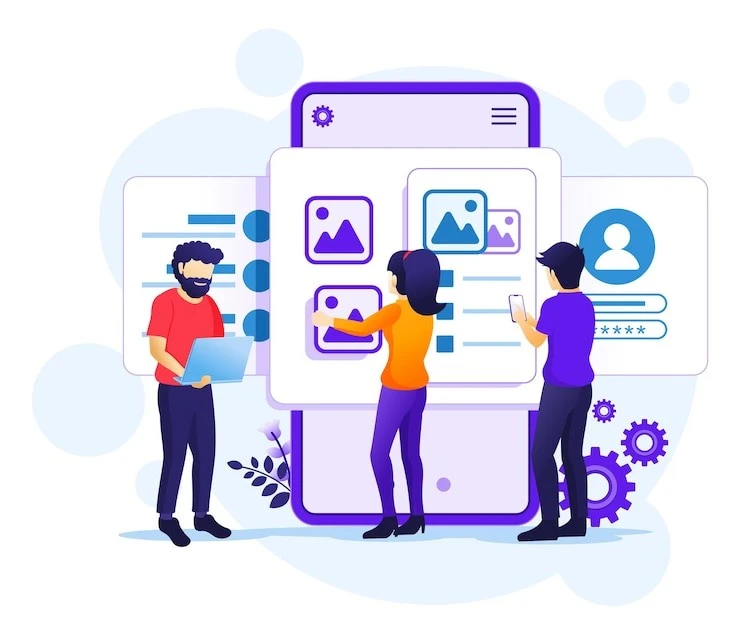Table of Content
Discover How Hard Is It to Make an App with No Coding Background
Today, a mobile application is no longer a luxury but often a necessity for businesses looking to engage with customers, streamline operations, and stay competitive. However, for business owners without a technical background, the prospect of creating an app can seem like navigating a complex and daunting technological maze.
The traditional perception of how hard is it to make an app is based on intricate coding, specialized skills, and a significant learning curve, scaring non-technical individuals from even considering it. Yet, the technological landscape has evolved significantly, offering new pathways and tools that are making app creation more accessible than ever before for those without a programming pedigree.
However, the rise of low-code and no-code development platforms has democratized the app creation process, empowering individuals with limited or no coding skills to bring their app ideas to life. These platforms offer intuitive visual interfaces, drag-and-drop functionality, and pre-built components, significantly simplifying the development workflow.
But, while these tools offer unprecedented accessibility, understanding their capabilities, limitations, and the strategic considerations involved in choosing the right approach is difficult. In this article, we will explore the realities of app development for non-techie business owners, identify the empowering potential of low-code/no-code solutions, and understand the continued relevance of custom mobile app development services. Let’s begin.
App Development for Non-Technical Business Owners

For business owners who lack a background in software development or coding, the idea of creating a mobile application for their business can initially feel overwhelming. The traditional image of app development often involves complex lines of code, specialized programming languages, and a deep understanding of software architecture.
This perception can create a significant barrier, leading non-technical individuals to believe that app creation is an endeavor solely within the realm of experienced developers. However, the technological advancements of recent years have significantly altered this landscape, making app development increasingly accessible to those without formal technical training.
The key shift lies in the emergence and maturation of user-friendly development platforms that take away much of the underlying coding complexity. These platforms provide visual interfaces and intuitive tools that allow non-technical users to design, build, and even deploy mobile applications with minimal or no coding required, often using popular cross-platform mobile app development frameworks.
This democratization of app development empowers business owners to directly participate in the creation of their mobile presence, bringing their unique business insights and customer understanding directly into the app development process. Instead of being solely reliant on translating their vision to technical experts, non-technical owners can now actively shape the functionality and user experience of their apps.
Why You Still Need to Be Careful With Low/No-Code App Builders
However, it’s important to acknowledge that while the accessibility has increased dramatically, a successful app development journey for a non-technical business owner still requires careful planning, a clear understanding of their business needs and target audience, and a willingness to learn the fundamentals of using these new development tools.
While coding skills may not be a prerequisite, a grasp of basic user interface (UI) and user experience (UX) principles, a clear articulation of the app’s required features, and a strategic approach to the development process remain essential for creating an effective and valuable mobile application. The focus shifts from mastering complex code to effectively leveraging the capabilities of these no-code and low-code platforms to translate a business vision into a functional mobile reality.
Understanding Low-Code and No-Code App Development – What Are They?

Low-code and no-code development platforms represent a significant paradigm shift in software creation, offering powerful mobile app development tools that enable individuals with limited or no traditional coding skills to build applications. Moreover, both no-code and low-code platforms often handle the underlying infrastructure, deployment, and maintenance aspects, further reducing the technical burden on non-technical users.
While both approaches aim to simplify the development process, they differ in the degree of coding knowledge required and the level of customization they offer. Understanding these distinctions is crucial for non-technical business owners to determine which approach best suits their needs and technical comfort level.
No-Code Development Platforms
They are designed to allow users to build applications without writing any code at all. These platforms typically provide a completely visual interface, often utilizing drag-and-drop functionality, pre-built components, and intuitive workflows. Users can assemble their applications by selecting and arranging these visual building blocks, configuring their behavior through point-and-click actions and pre-defined logic.
No-code platforms are ideal for creating simpler applications with standard functionalities, such as internal tools, basic customer portals, data collection forms, and simple workflow automation apps. They offer a rapid development cycle, are highly accessible to individuals with no programming experience whatsoever, empowering business owners to quickly prototype, and deploy basic mobile solutions.
Low-Code Development Platforms
On the other hand, they minimize the need for extensive coding but still allow for some level of custom code when required for more complex functionalities or integrations. These platforms also offer visual development tools and pre-built components, but they provide the flexibility to extend the application’s capabilities by writing small snippets of code in a user-friendly language or through integrations with other services via APIs (Application Programming Interfaces).
Low-code platforms strike a balance between ease of use and customization, making them suitable for a wider range of applications, including more complex business applications, customer-facing apps with specific UI/UX requirements, and integrations with existing enterprise systems. While they don’t require deep coding expertise, a basic understanding of logical concepts and potentially some scripting knowledge can be beneficial for leveraging the full potential of low-code platforms.
Opting for Custom App Development Over Developing the App Yourself

While the rise of low-code and no-code platforms offers an empowering avenue for non-technical business owners to create their own applications, there are scenarios where opting for custom app development, involving professional software developers, remains the more strategic and ultimately beneficial choice. Understanding when to leverage these different approaches is crucial for achieving the desired outcomes and ensuring the long-term success of the mobile application.
Custom app development involves hiring experienced software developers or engaging a development agency to build an application tailored precisely to the specific needs and requirements of the business. This approach offers unparalleled flexibility and the ability to create highly complex and unique applications with bespoke features, intricate integrations, and sophisticated user interfaces.
However, knowing how to hire developers for startups can be another hassle. Nevertheless, for non-technical business owners with complex app ideas or a need for a highly specialized mobile solution, partnering with experienced developers ensures that their vision is translated into a robust, scalable, and high-performing application that meets their exact requirements.
When to Opt for Custom App Development Services?
For businesses with highly specialized needs, complex workflows, or a desire for a truly differentiated and branded mobile experience, custom development provides the level of control and customization that low-code and no-code platforms may not be able to fully deliver. When an app requires seamless integration with legacy systems, the implementation of cutting-edge technologies, or adherence to stringent security and compliance standards, custom development often provides the most robust and reliable solution.
Furthermore, custom development allows for a deeper level of optimization for performance, scalability, and maintainability. Professional developers can architect the application with future growth in mind, ensuring that it can handle increasing user loads and adapt to evolving business needs. They also possess the expertise to write clean, efficient, and well-documented code, which is crucial for long-term maintainability and updates.
While the initial investment in custom app development is typically higher and the development timeline longer compared to using no-code or low-code platforms, the resulting application can offer a significant competitive advantage through its tailored functionality, superior performance, and seamless integration with the business’s existing infrastructure.
FAQs
| Is it hard to create your own app? Nowadays, with the rising popularity of no/low-code app builders, it has become far easier to build your own app, even without technical knowledge. However, the more complex the app, the more technical complexity is added to the app. |
| How much does it cost to make an app? Generally, a simple app would cost you anywhere between $5000-15000 on average. However, as you increase the complexity of the app, such as integrating more APIs, then the cost increases. |
Conclusion
In 2025, how hard is it to make an app for non-technical business owners has become significantly more navigable thanks to the advent of low-code and no-code platforms. For simpler applications with standard features, these platforms offer a rapid and accessible pathway to mobile presence.
However, it’s crucial for non-technical business owners to recognize the limitations of these tools and understand when the complexity, unique requirements, or need for deep integration and scalability necessitate opting for custom app development.

Empower your digital journey with StruqtIO - Your dedicated partner for cutting-edge custom software development, innovation, and digital transformative solutions. Harness the power of technology to elevate your business and redefine your digital landscape today.


